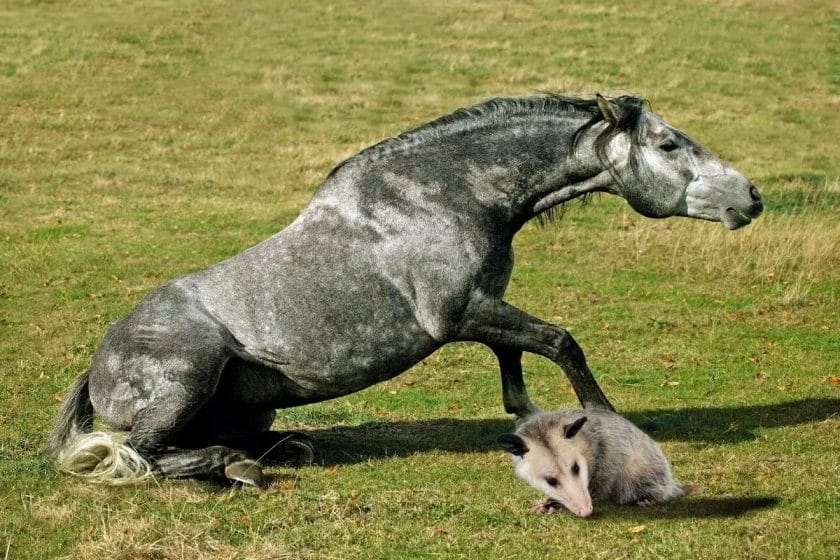A horse’s lifespan can vary depending on various factors, including its overall health and any medical conditions it may develop, such as cancer. While there is no definitive answer to how long a horse can live with cancer, early detection and proper treatment can greatly improve the chances of a positive outcome. It is crucial for horse owners to work closely with their veterinarian to develop a personalized treatment plan that addresses their horse’s specific needs and maximizes their quality of life.

Early Warning Signs of Cancer in Horses: What to Look For
As horse owners and enthusiasts, it is important for us to be aware of the early warning signs of cancer in horses. Detecting cancer in its early stages can significantly improve the chances of successful treatment and recovery. In this section, we will discuss the common early warning signs of cancer in horses and what to look for.
1. Unexplained Weight Loss
One of the early warning signs of cancer in horses is unexplained weight loss. If your horse is losing weight without any apparent reason such as a change in diet or increased exercise, it may be a cause for concern. Cancer can affect the horse’s metabolism and lead to a loss of appetite and subsequent weight loss. It is important to monitor your horse’s weight regularly and consult a veterinarian if you notice a significant and unexplained drop.
2. Abnormal Lumps or Swellings
Another potential sign of cancer in horses is the presence of abnormal lumps or swellings. These lumps may appear anywhere on the horse’s body and can vary in size and texture. It is important to regularly check your horse for any new or unusual lumps and consult a veterinarian if you discover any. While not all lumps are cancerous, it is better to be safe and have them examined.
3. Changes in Behavior or Temperament
Cancer can also manifest in changes in a horse’s behavior or temperament. If your horse suddenly becomes aggressive, irritable, or loses interest in activities it once enjoyed, it may be a sign of an underlying health issue, including cancer. It is essential to pay attention to any significant changes in your horse’s behavior and consult a veterinarian for further evaluation.
4. Difficulty Eating or Swallowing
Horses with tumors in the mouth, throat, or esophagus may experience difficulty eating or swallowing. They may show signs of discomfort while eating or exhibit drooling, coughing, or gagging. If you notice any changes in your horse’s eating habits or observe these symptoms, it is crucial to have them evaluated by a veterinarian.
5. Abnormal Discharge
An abnormal discharge from any part of the horse’s body can be indicative of cancer. Discharge from the eyes, nose, mouth, or genitals should not be ignored, as it may signal an underlying health issue. If you notice any unusual discharge, it is essential to consult a veterinarian for a thorough examination.
6. Lameness or Difficulty Moving
Certain types of cancer, such as bone cancer or tumors affecting the musculoskeletal system, can cause lameness or difficulty in moving. If your horse displays an unexplained change in gait, stiffness, or reluctance to move, it may be a sign of an underlying health issue, including cancer. Timely veterinary intervention is essential to diagnose and address the problem.
7. Chronic Wounds or Sores
Chronic wounds or sores that do not heal as expected may be a sign of cancer in horses. If your horse has a wound or sore that fails to respond to treatment or keeps recurring, it is crucial to have it examined by a veterinarian. Cancerous growths can impair the healing process, leading to persistent or worsening wounds.
In summary, being aware of the early warning signs of cancer in horses is vital for prompt detection and treatment. Keep a close eye on your horse’s weight, check for any abnormal lumps or swellings, monitor behavior changes, observe eating difficulties or abnormal discharge, watch for lameness or difficulty in moving, and pay attention to chronic wounds or sores. Regular veterinary check-ups and proactive monitoring can help ensure the overall health and well-being of your horse.

Treatment Options for Equine Cancer: Surgery, Radiation, and Alternative Therapies
Equine cancer is a serious and potentially life-threatening condition that affects horses of all breeds and ages. When it comes to treating this disease, there are several options available, including surgery, radiation therapy, and alternative therapies. In this section, we will explore each of these treatment options in detail.Surgery
Surgery is often the first line of treatment for equine cancer, especially when the tumor is localized and accessible. The goal of surgery is to remove the tumor or as much of it as possible, along with any surrounding tissue that may be affected. This can be a challenging procedure, as it requires careful planning and precision to ensure complete removal without causing harm to the horse. During the surgery, the horse is put under general anesthesia to ensure its comfort and safety. The surgeon will make an incision to gain access to the tumor and carefully remove it. In some cases, reconstructive surgery may also be required to restore the affected area’s normal structure and function.Radiation Therapy
Radiation therapy is another treatment option for equine cancer. It involves the use of high-energy radiation beams to destroy cancer cells and shrink tumors. This treatment is often used when surgery is not feasible or as a follow-up to surgery to ensure any remaining cancer cells are eliminated. During radiation therapy, the horse is positioned carefully to ensure accurate targeting of the tumor. The radiation beams are delivered with precision to minimize damage to the surrounding healthy tissues. This treatment is usually administered over several sessions to achieve the desired results.Alternative Therapies
In addition to conventional treatments like surgery and radiation therapy, alternative therapies are also gaining recognition as potential options for managing equine cancer. These therapies focus on holistic approaches to support the horse’s overall well-being and strengthen its immune system. Some examples of alternative therapies for equine cancer include naturopathy, acupuncture, herbal medicine, and nutritional therapy. These treatments aim to enhance the body’s natural healing abilities, alleviate side effects of conventional treatments, and improve the horse’s quality of life. It’s important to note that alternative therapies should not be used as standalone treatments for equine cancer. They should be used in conjunction with conventional treatments under the guidance of a qualified veterinarian who specializes in integrative medicine. In summary, equine cancer can be treated through various approaches, including surgery, radiation therapy, and alternative therapies. The choice of treatment depends on factors such as the type and stage of cancer, the horse’s overall health, and the available resources. Working closely with a veterinarian is essential to determine the most appropriate treatment plan for each individual horse. With advancements in veterinary medicine, the prognosis for equine cancer has improved, and early detection followed by timely and appropriate treatment can greatly increase the chances of a successful outcome.
Managing the Quality of Life for Horses with Cancer: Supportive Care and Palliative Measures
Cancer can have a devastating impact on the lives of horses. It not only affects their physical health but also takes a toll on their overall well-being. As horse owners, it is our responsibility to ensure that our equine companions receive the best possible care during this challenging time. In addition to medical treatments, supportive care and palliative measures play a crucial role in managing the quality of life for horses with cancer.
Understanding Supportive Care
Supportive care focuses on providing comfort and improving the overall well-being of horses with cancer. It involves addressing the physical and emotional needs of the animal, alleviating pain and discomfort, and promoting a sense of calm and security. Some key aspects of supportive care for horses with cancer include:
- Regular veterinary check-ups: Regular visits to the veterinarian are essential to monitor the progression of the cancer and adjust the treatment plan accordingly. It also provides an opportunity to address any concerns or symptoms that may arise.
- Pain management: Cancer can cause significant pain and discomfort in horses. Various pain management strategies, including medication, acupuncture, and physical therapy, can help alleviate these symptoms and improve the horse’s quality of life.
- Dietary adjustments: A nutritious and balanced diet is crucial for horses with cancer. Consultation with a veterinarian or equine nutritionist can help develop a feeding plan that supports the horse’s immune system, provides essential nutrients, and manages any specific dietary requirements.
- Maintaining a comfortable environment: Creating a comfortable and stress-free environment for the horse can have a positive impact on their well-being. This may involve providing adequate shelter, appropriate bedding, and social interaction with other horses or companion animals.
Implementing Palliative Measures
Palliative measures aim to improve the horse’s quality of life by managing symptoms and promoting comfort. These measures are especially important in cases where curative treatment options are limited or not feasible. Some common palliative measures for horses with cancer include:
- Wound care: Cancerous growths can lead to open wounds or skin lesions. Proper wound care, including regular cleaning, bandaging, and the use of topical treatments, can help prevent infection and promote healing.
- Physical therapy and rehabilitation: Physical therapy techniques, such as massage, stretching exercises, and hydrotherapy, can help alleviate pain, improve joint mobility, and enhance overall well-being.
- Psychological support: Horses, like humans, can experience emotional distress when dealing with a cancer diagnosis. Providing them with gentle and compassionate care, along with opportunities for mental stimulation and social interaction, can help improve their emotional well-being.
- Complementary therapies: Some alternative therapies, such as herbal remedies, aromatherapy, and acupuncture, may be beneficial in managing certain symptoms associated with cancer in horses. It is important to consult with a qualified equine practitioner before implementing these treatments.
In Summary
Caring for horses with cancer involves more than just medical treatments. Supportive care and palliative measures are essential components of managing the quality of life for these animals. By providing comfort, pain management, and emotional support, we can help alleviate their suffering and improve their overall well-being. Regular veterinary check-ups, proper wound care, appropriate nutrition, and maintaining a comfortable environment are all vital aspects of supportive care. Palliative measures, such as physical therapy, psychological support, and complementary therapies, can also play a significant role in enhancing the horse’s quality of life during their cancer journey. With a comprehensive approach to care, we can ensure that horses with cancer receive the best possible support and maintain a good quality of life.
Hope and Recovery Stories: Inspiring Examples of Horses Beating Cancer
Horses, majestic and powerful beings, are unfortunately not invincible. They too can be affected by the devastating disease of cancer. However, even in the face of such a formidable opponent, there are countless stories of hope and recovery that inspire us all. In this section, we will explore some incredible examples of horses who have triumphed over cancer, proving that with the right treatment and a little bit of luck, anything is possible.
1. Warrior’s Tale
One remarkable story is that of Warrior, a beloved thoroughbred who was diagnosed with lymphoma, a type of cancer that affects the lymphatic system. His owners, devastated by the news, refused to give up on their faithful companion. They immediately sought out the expertise of a renowned veterinary oncologist who devised a comprehensive treatment plan for Warrior.
Warrior endured months of chemotherapy and radiation therapy, but his spirit remained strong throughout his battle against cancer. His owners, veterinary team, and countless supporters rallied behind him, providing the love and care he needed to keep fighting. And fight, he did.
After a grueling treatment journey, Warrior finally received the news that he was cancer-free. His triumphant recovery not only brought tears of joy to his owner’s eyes, but it also inspired others facing similar challenges to never lose hope.
2. Phoenix Rising
Another incredible story is that of Phoenix, a spirited Arabian horse who faced a daunting diagnosis of melanoma, a type of skin cancer commonly found in gray horses. Phoenix’s owner, determined to give him a fighting chance, sought out alternative therapies to complement traditional treatments.
Alongside conventional treatments such as surgery and chemotherapy, Phoenix underwent holistic therapies like acupuncture, herbal supplements, and a specialized diet. These integrative approaches aimed to boost his immune system and enhance his overall well-being.
Months turned into years, and Phoenix continued to defy the odds. His tumors decreased in size, and his energy levels soared. His unwavering determination and the combined efforts of his veterinary team and dedicated owner ultimately led to his miraculous recovery.
3. Miracle’s Journey
The story of Miracle, a gentle quarter horse, is one that touches the hearts of all who hear it. Diagnosed with a rare form of bone cancer, Miracle faced a challenging road ahead. His owner, unwilling to accept defeat, embarked on a quest to find the best possible treatment options.
Miracle underwent intense radiation therapy and underwent a groundbreaking surgical procedure that involved the removal and reconstruction of a portion of his affected bone. The procedure was highly risky, but his owner firmly believed that it was Miracle’s best chance at a full recovery.
Months of recovery and rehabilitation followed, but Miracle’s determination was unyielding. With each passing day, he grew stronger, defying expectations and proving that miracles do happen.
In Summary
These are just a few examples of the countless horses who have overcome cancer against all odds. Their stories remind us of the resilience and fighting spirit that dwell within these magnificent creatures. They serve as beacons of hope, inspiring others to never give up and to pursue every available avenue in the battle against cancer.
Hope and recovery are not mere concepts when it comes to these horses. They are real, tangible outcomes that are made possible through the unwavering dedication of their owners, the expertise of veterinary professionals, and the incredible spirit of these remarkable animals.
FAQs
1. How long can a horse live with cancer?
The lifespan of a horse with cancer can vary depending on various factors such as the type and stage of cancer, treatment options, and the overall health of the horse. In some cases, horses can live for several months to a few years with cancer.
2. What are the common signs of cancer in horses?
Common signs of cancer in horses can include abnormal growths or lumps, weight loss, decreased appetite, difficulty swallowing, lameness, abnormal bleeding, and changes in behavior. If you notice any of these signs, it’s important to consult a veterinarian for further evaluation.
3. Can cancer in horses be treated?
Yes, cancer in horses can be treated depending on various factors such as the type and stage of cancer, availability of treatment options, and the overall health of the horse. Treatment options may include surgery, radiation therapy, chemotherapy, or a combination of these approaches. It’s recommended to consult with a veterinarian to discuss the best treatment plan for your horse.
Conclusion
In conclusion, the lifespan of a horse with cancer can vary depending on various factors. While there is no definitive answer to how long a horse can live with cancer, early detection and prompt treatment can significantly improve their chances of survival. It is important for horse owners to be vigilant and monitor their horse’s health closely, seeking professional veterinary advice at the first sign of any abnormalities. With advancements in veterinary medicine and ongoing research, there is hope for extending the lives of horses affected by cancer. Remember, every case is unique, and a tailored treatment plan can provide the best possible outcome.
